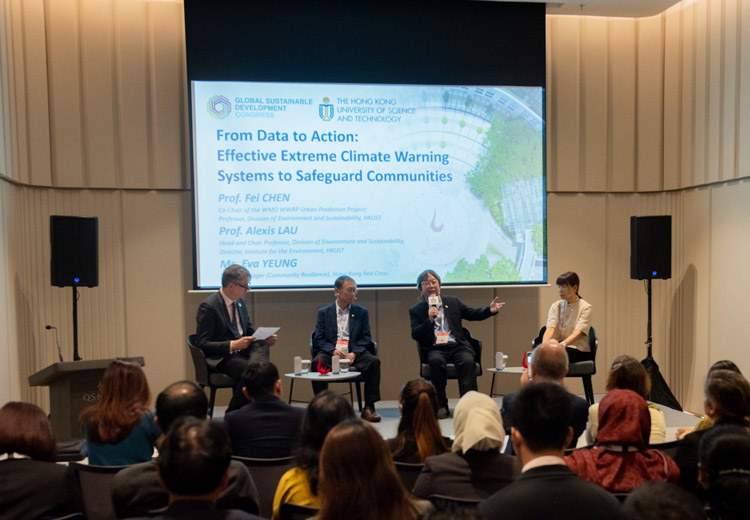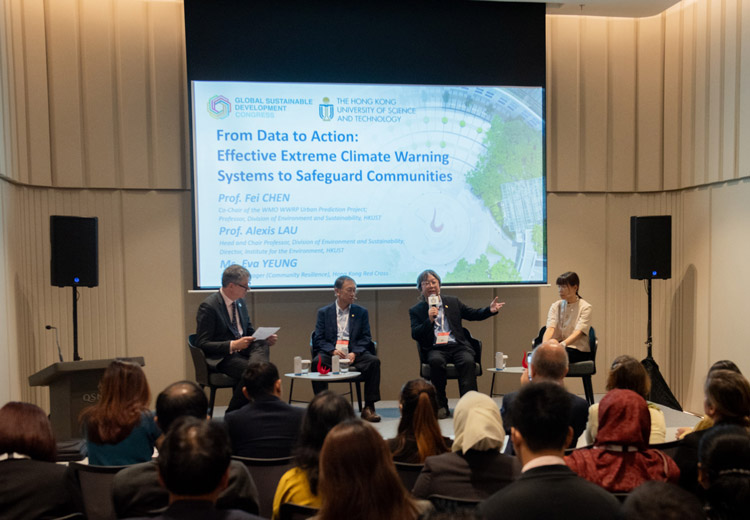Eliminating silos in higher education to tackle climate change

Sponsored by

Sponsored by

During the 2024 THE Global Sustainable Development Congress, experts discussed a holistic approach to climate change early-warning systems
The record heatwave taking place in Thailand has already killed more than 60 people since the start of 2024. The climate emergency in the country, and elsewhere, is increasingly severe and pressing. During a recent discussion at the 2024 THE Global Sustainable Development Congress in Bangkok, representatives from international organisations, academia and community-based social support groups came together to examine the creation of early-warning systems to alleviate climate and health crises.
“There is no doubt that the world is in crisis,” said Duncan Ross, chief data officer at THE. “Higher education is critical here but we also need to understand how higher education can interact with our broader communities.” Fei Chen, co-chair of the World Weather Research Programme’s Urban Prediction Project at the World Meteorological Organization and professor at the Division of Environment and Sustainability at the Hong Kong University of Science and Technology (HKUST), spoke about the importance of adopting an international approach to tackling climate change.
“To enhance our observations and improve climate disaster warning systems, we need access to data,” Chen explained. “We need to engage with local stakeholders, governments and community leaders to improve resilience. All urban climate adaptation actions must also be taken locally because every city is different and has a different climate risk.” The importance of both collaboration and coordination was highlighted in Chen’s presentation.
“Air quality has become an important issue in Hong Kong,” added Alexis Lau, head of the Division of Environment and Sustainability at HKUST. “We’ve developed an early-warning system for this issue that we think can be used for other hazards, including heatwaves.”
Lau explained that early warning technologies that have displayed utility can potentially be extrapolated and applied to other extreme weather events. However, these technologies must move beyond giving generic information, ideally providing personalised advice.
“We recently developed a personalised real-time air quality informatics system for exposure,” Lau continued. “With this system, we can help people manage their individual exposure to poor air quality. We can build a numerical weather prediction system combined with air quality that gives high-resolution information.” An effective early warning system is about providing individuals with information about their personal risk factors. Of course, financial issues come into play here but they are not always fully understood.
“From an investment point of view, for every US dollar spent on disaster preparedness, you can save up to 15 in disaster relief,” said Eva Yeung, senior manager of community resilience service at the Hong Kong Red Cross. “That is why it is so important to build community resilience,” Yeung added. The reality is that climate change does not affect everyone equally, with effects varying by demographic, location and socioeconomic background. Altogether, it represents a complex conundrum but one that “as a scientist is also an exciting one to confront”, Chen explained. However, solving it will require all stakeholders to work together. They cannot operate in silos if they want to overcome a challenge of this scale, he said.
The panel:
- Alexis Lau, head, Division of Environment and Sustainability, Hong Kong University of Science and Technology
- Fei Chen, co-chair, World Weather Research Programme’s Urban Prediction Project and professor, Division of Environment and Sustainability, Hong Kong University of Science and Technology
- Duncan Ross, chief data officer, Times Higher Education (chair)
- Eva Yeung, senior manager of community resilience service, Hong Kong Red Cross
Find out more about the Hong Kong University of Science and Technology.
